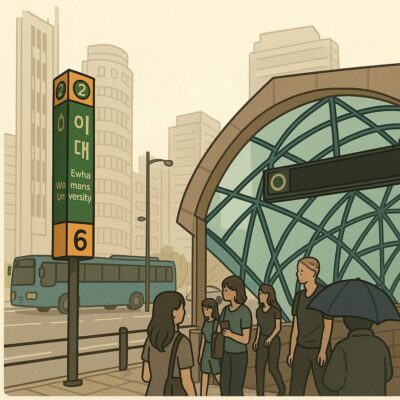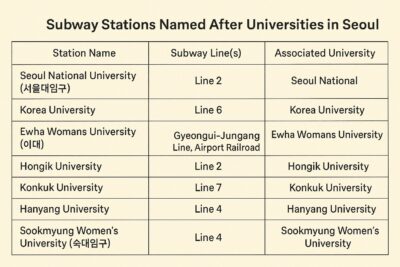Seoul, a city where education plays a vital role in shaping its culture and economy, reflects this importance even in its subway system.
Several subway stations across the city proudly carry the names of prestigious universities, offering not just convenience for students but also branding opportunities for the institutions themselves.
Let’s explore this interesting blend of urban transportation and academic identity.

—
Why Do Subway Stations Have University Names?
In Seoul, universities are often major landmarks in their neighborhoods. By naming nearby subway stations after them, the city provides:
Easier wayfinding for students, faculty, and visitors
Brand recognition for universities, reinforcing their presence in the urban fabric
Support for local economies, as cafes, bookstores, and student-oriented businesses thrive around these stations
This practice also subtly highlights how deeply education is embedded into Seoul’s city life.
—
Examples of University-Named Subway Stations
Here are some well-known examples:

Some stations, like Hongik University Station and Konkuk University Station, are not only student hubs but have also evolved into major cultural and commercial hotspots.
—
Urban and Business Opportunities Around These Stations
Thanks to the continuous flow of students, staff, and visitors, the areas around university-named stations are always vibrant.
This brings significant opportunities:
• Student-centered businesses: Cafes, guesthouses, study cafes, and restaurants flourish.
• Startups and coworking spaces: Many tech and creative startups set up offices near universities.
• Cultural hubs: Some stations like Hongik University Station have grown into major centers for art, music, and youth culture.
For real estate developers, these zones offer strong potential for residential projects (off-campus housing), retail, entertainment, and flexible office spaces.
—
Global Business Opportunities: Reaching a Diverse Audience
Another unique feature of university neighborhoods in Seoul is the large population of international students.
Universities like HUFS (Hankuk University of Foreign Studies), Konkuk University, and Seoul National University have thousands of foreign students, creating a multicultural atmosphere around nearby subway stations.
This offers an ideal environment for global food and retail brands to thrive:
• International cuisine: Turkish kebab shops, Vietnamese pho restaurants, American burger chains, and Japanese ramen spots are already popular—and there’s still room for more variety.
• Global retail brands: Fashion brands, bookstores with foreign language sections, and international convenience stores find ready audiences here.
• Cultural services: Language academies, cultural cafes, and study centers geared toward foreigners can tap into this growing market.
Opening a global food or lifestyle brand near a university-named station isn’t just a niche business; it’s an opportunity to grow with Seoul’s increasingly international young population.
Subway stations named after universities in Seoul aren’t just about transportation—they tell a deeper story about the city’s identity.
They symbolize Seoul’s commitment to education and innovation while creating lively, opportunity-rich neighborhoods.
As Seoul continues to grow, these university hubs will likely become even more important, serving as engines of both knowledge and urban vibrancy—and offering exceptional opportunities for both local and global businesses.
—
If you want,we can also make a more detailed report for you and suggest a few specific station-area combinations where opening a Turkish kebab shop or global café could work particularly well!

0 Comments